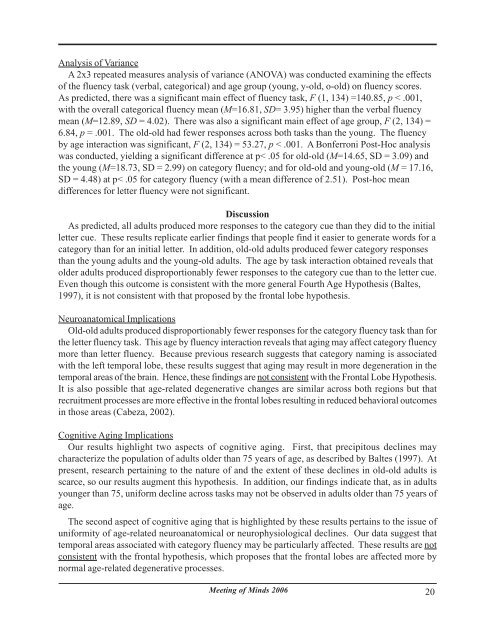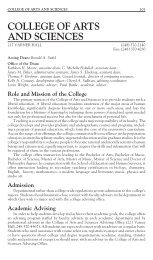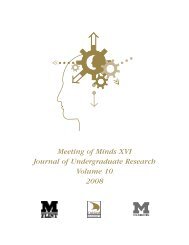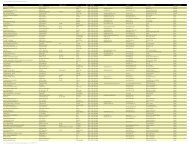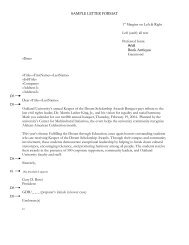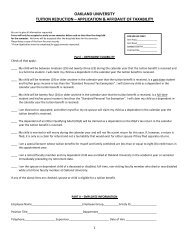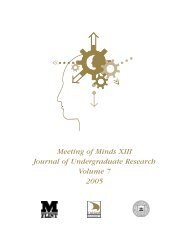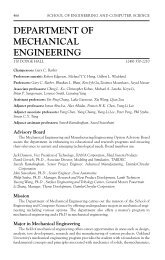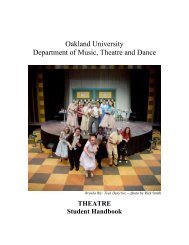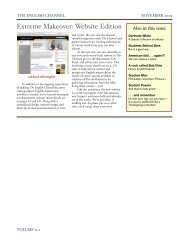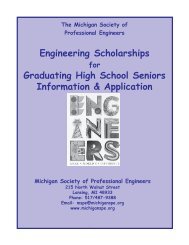MOM 2006 journal for pdf.pmd - University of Michigan-Flint
MOM 2006 journal for pdf.pmd - University of Michigan-Flint
MOM 2006 journal for pdf.pmd - University of Michigan-Flint
You also want an ePaper? Increase the reach of your titles
YUMPU automatically turns print PDFs into web optimized ePapers that Google loves.
Analysis <strong>of</strong> Variance<br />
A 2x3 repeated measures analysis <strong>of</strong> variance (ANOVA) was conducted examining the effects<br />
<strong>of</strong> the fluency task (verbal, categorical) and age group (young, y-old, o-old) on fluency scores.<br />
As predicted, there was a significant main effect <strong>of</strong> fluency task, F (1, 134) =140.85, p < .001,<br />
with the overall categorical fluency mean (M=16.81, SD= 3.95) higher than the verbal fluency<br />
mean (M=12.89, SD = 4.02). There was also a significant main effect <strong>of</strong> age group, F (2, 134) =<br />
6.84, p = .001. The old-old had fewer responses across both tasks than the young. The fluency<br />
by age interaction was significant, F (2, 134) = 53.27, p < .001. A Bonferroni Post-Hoc analysis<br />
was conducted, yielding a significant difference at p< .05 <strong>for</strong> old-old (M=14.65, SD = 3.09) and<br />
the young (M=18.73, SD = 2.99) on category fluency; and <strong>for</strong> old-old and young-old (M = 17.16,<br />
SD = 4.48) at p< .05 <strong>for</strong> category fluency (with a mean difference <strong>of</strong> 2.51). Post-hoc mean<br />
differences <strong>for</strong> letter fluency were not significant.<br />
Discussion<br />
As predicted, all adults produced more responses to the category cue than they did to the initial<br />
letter cue. These results replicate earlier findings that people find it easier to generate words <strong>for</strong> a<br />
category than <strong>for</strong> an initial letter. In addition, old-old adults produced fewer category responses<br />
than the young adults and the young-old adults. The age by task interaction obtained reveals that<br />
older adults produced disproportionably fewer responses to the category cue than to the letter cue.<br />
Even though this outcome is consistent with the more general Fourth Age Hypothesis (Baltes,<br />
1997), it is not consistent with that proposed by the frontal lobe hypothesis.<br />
Neuroanatomical Implications<br />
Old-old adults produced disproportionably fewer responses <strong>for</strong> the category fluency task than <strong>for</strong><br />
the letter fluency task. This age by fluency interaction reveals that aging may affect category fluency<br />
more than letter fluency. Because previous research suggests that category naming is associated<br />
with the left temporal lobe, these results suggest that aging may result in more degeneration in the<br />
temporal areas <strong>of</strong> the brain. Hence, these findings are not consistent with the Frontal Lobe Hypothesis.<br />
It is also possible that age-related degenerative changes are similar across both regions but that<br />
recruitment processes are more effective in the frontal lobes resulting in reduced behavioral outcomes<br />
in those areas (Cabeza, 2002).<br />
Cognitive Aging Implications<br />
Our results highlight two aspects <strong>of</strong> cognitive aging. First, that precipitous declines may<br />
characterize the population <strong>of</strong> adults older than 75 years <strong>of</strong> age, as described by Baltes (1997). At<br />
present, research pertaining to the nature <strong>of</strong> and the extent <strong>of</strong> these declines in old-old adults is<br />
scarce, so our results augment this hypothesis. In addition, our findings indicate that, as in adults<br />
younger than 75, uni<strong>for</strong>m decline across tasks may not be observed in adults older than 75 years <strong>of</strong><br />
age.<br />
The second aspect <strong>of</strong> cognitive aging that is highlighted by these results pertains to the issue <strong>of</strong><br />
uni<strong>for</strong>mity <strong>of</strong> age-related neuroanatomical or neurophysiological declines. Our data suggest that<br />
temporal areas associated with category fluency may be particularly affected. These results are not<br />
consistent with the frontal hypothesis, which proposes that the frontal lobes are affected more by<br />
normal age-related degenerative processes.<br />
Meeting <strong>of</strong> Minds <strong>2006</strong> 20


